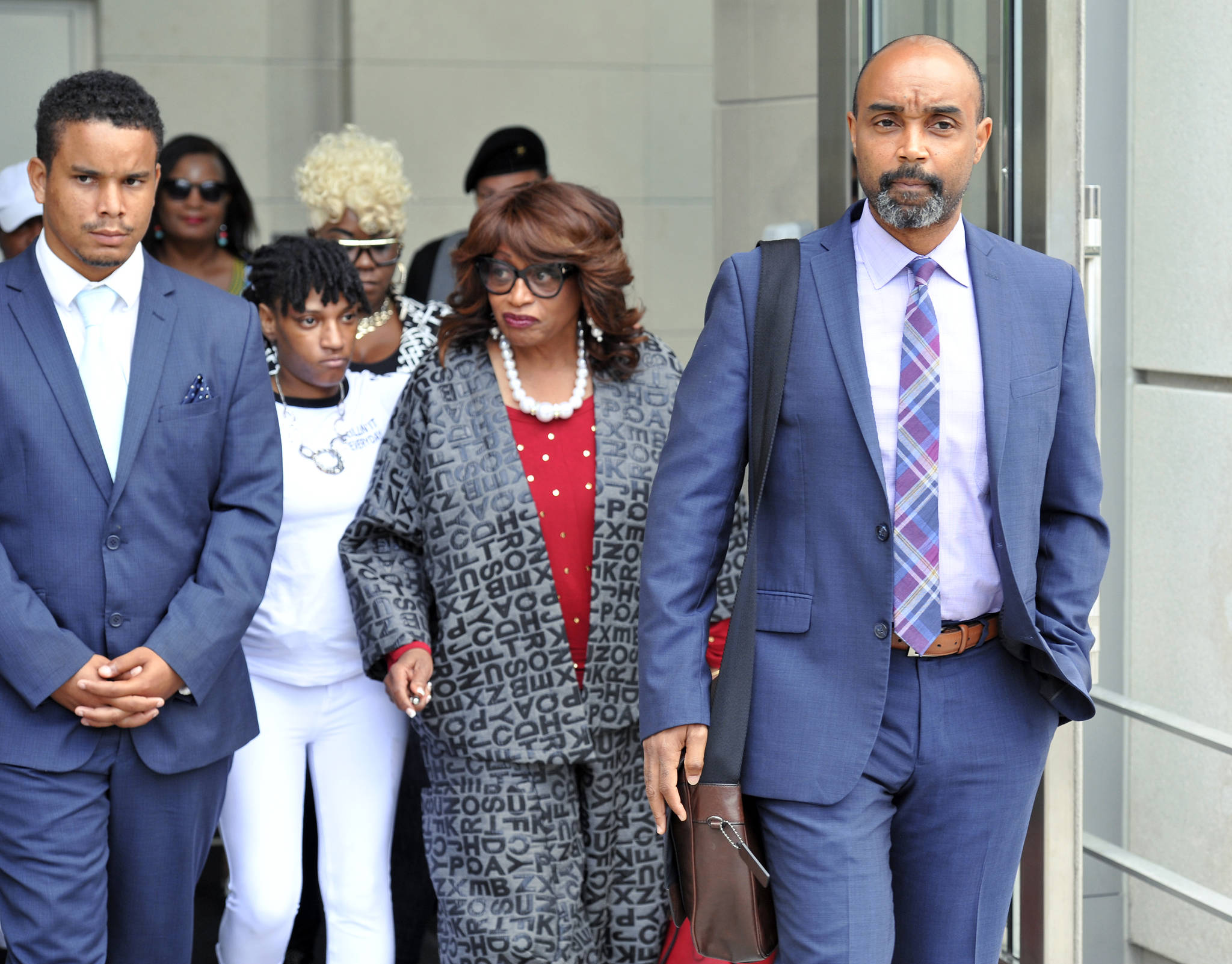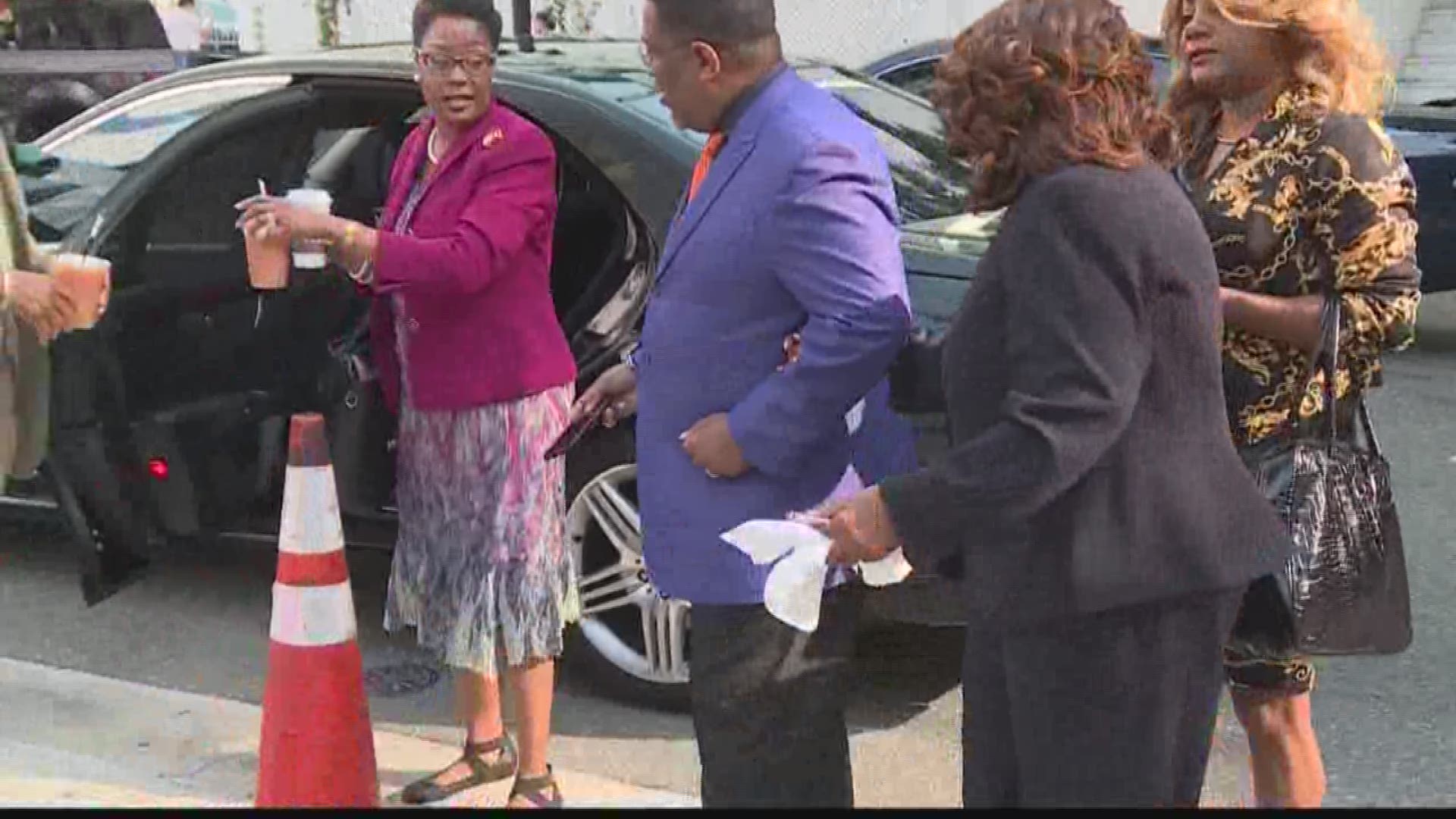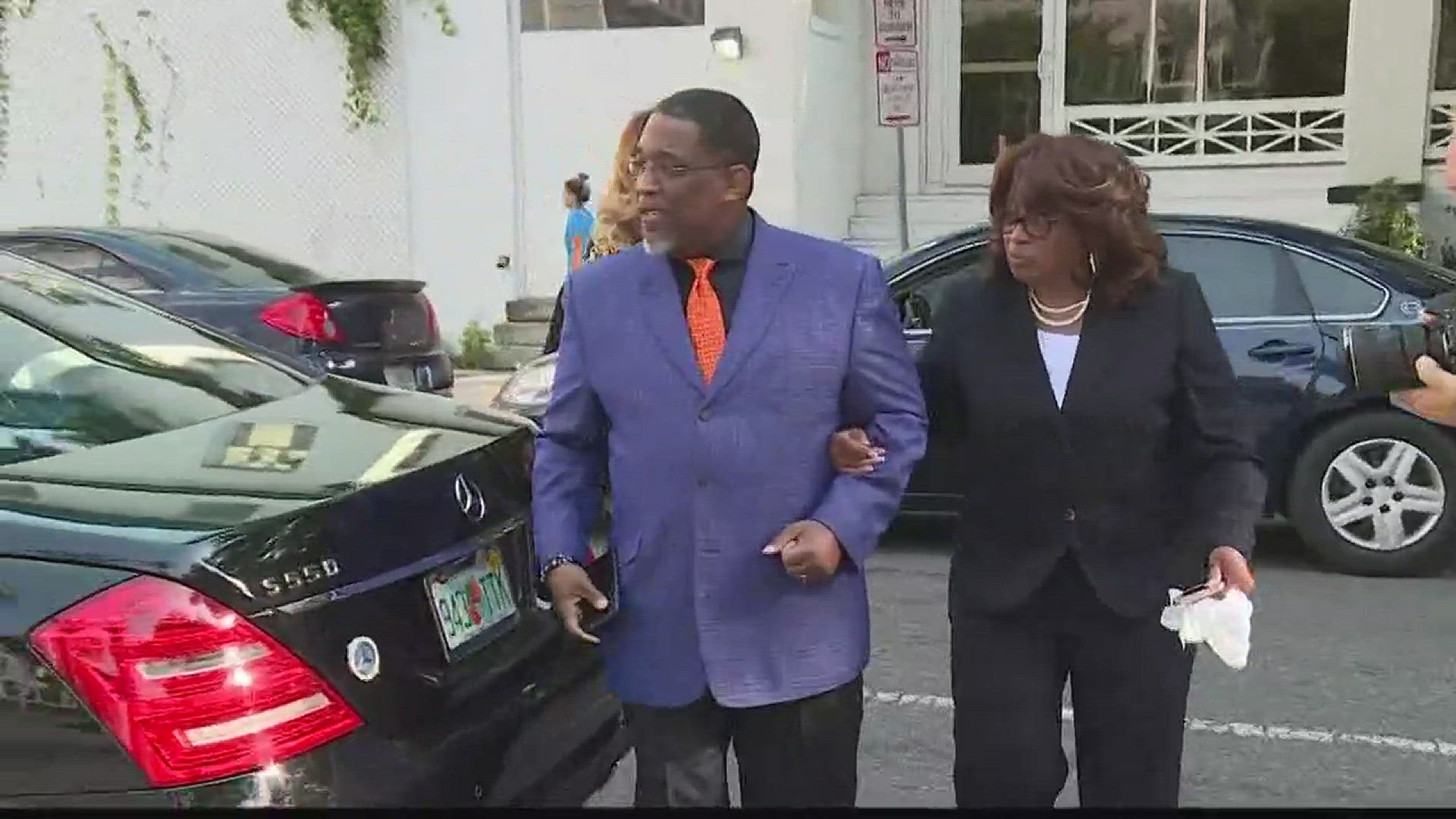It took two and a half days of jury selection and a full week of testimony before former Congresswoman Corrine Brown took the stand in her own defense. Her testimony was often emotional, at times tearful, and once, during her cross-examination, funny.
Brown sat on the witness stand accused of mail, wire and tax fraud. A federal indictment handed down last year charged her with 22 counts of a 24-count indictment. If she's convicted on all counts, she faces up to 357 years in prison and a $4 million fine.
Her testimony, which lasted a little under four hours, will spill into Friday. Her attorney, James Smith, questioned her over the course of the afternoon, covering things like her work for her district, her relationship with Ronnie Simmons, her chief of staff, and her 'workaholic' and 'shopaholic' monikers.
"Some witnesses describe you as a spending machine - shopping all day," Smith said well over an hour into direct examination of the former congresswoman.
"Everybody that I know, knows I'm a workaholic - that's what they know about me - a workaholic," she indignantly said to the jury. "I work from early in the morning to late at night and if, on the way home, I stop by the drugstore or on the weekend I go to Sam's Club I'm buying items for my mother." She became emotional.
The former representative covered nearly all aspects of her life during questioning. She told the court about her education, attending Florida A&M and then the University of Florida. She told the court she worked at what is now the Florida State College at Jacksonville for 16 years. She talked about running for the state House of Representatives in 1979, losing before running again two years later and winning.
She was elected to the U.S. House in 1992 and took office the following January. Ronnie Simmons was her campaign manager. He's also named on Brown's indictment but pleaded guilty to two counts in February of this year and testified against his former boss earlier this week.
Smith asked what she thought of Simmons when she first met him 30 years ago.
"I like him," she said. "A nice young man."
She added that he worked for her part-time at a travel agency she owned and then worked as a staffer in the state house.
After he led her campaign to victory, Simmons took on the role of her chief of staff. He ran her office until she lost the 2016 election - 23 years later.
"Why trust Ronnie Simmons?" Smith asked her after she admitted to hiring him even though he didn't have any experience running a congressional office.
"Well, I - I wanted to groom him," she replied. "I saw potential and I thought he could do the job and I wanted to give the young man a chance."
Over the years, she told the jury Simmons took on a larger and larger role in her office. Already working from 9 until 8 in the evening, she said her day got even longer and she had even less time to manage her office when she became the ranking Democrat on the Veterans Affairs House Committee. So she delegated more to her staffers, especially Simmons.
The prosecution pointed repeatedly during their case to the dozens of cash deposits the congresswoman received between 2009 - 2015. Thousands of dollars made their way into Brown's account from a bogus charity called One Door For Education, the Alexander Agency - a public relations firm run by one of her staffers - and the Community Rehabilitation Center - a nonprofit run by her longtime friend and Jacksonville City Councilman Reginald Gaffney.
Brown said under oath she never did any online banking and added she didn't even have a computer in her office.
"Well, one in the back desk," she clarified. "It was never turned on - I know they're laughing at me but everybody doesn't have computer skills," she said after chuckles came from the gallery.
She also said she never saw the financial information for One Door - the charity she helped raise $833,000 for over a period of four years. Simmons testified he brought the charity to Brown's attention in 2012 to fund an annual Congressional Black Caucus Foundation reception.
"It was not that big of a issue for me," Brown says of One Door. She said there were four things she'd always try to raise money for:
— Jacob Rodriguez (@jd_rodriguez9) May 4, 2017
"[Ronnie said] they're a charity that would be working with us on some of our initiatives," she testified. "I don't remember the exact discussion but I know it took place."
One Door was one of the four causes she would raise money for from 2012 on, the other three being her Friends of Corrine Brown campaign account, her leadership PAC to raise money for the Democratic party, and her legal fund to fight her seat's redistricting.
She told the court she hated fundraising.
"Are you very good at fundraising?" Smith asked.
"That's a joke," came the former congresswoman's quick reply. "I suck, basically. You saw my fundraising team and all of them were subpoenaed."
Brown said she would hold fundraisers but if they didn't raise any money or cost too much, she wouldn't try the same event again. She referred to several fundraisers brought up at trial and paid for by One Door: a suite at a Jaguars-Redskins NFL game in 2014 and a TPC golf tournament in 2013.
She also touched on the $750 cake and a drink called the Queen Corrine brought up early on in testimony. The prosecution used those to argue Brown was using One Door funds she'd solicited donors to give to throw a lavish party for herself.
Brown said those receptions were anything but: "When I go to these functions I usually don't drink, don't eat; I'm busy socializing... I never taste the food." She added that she rarely planned the receptions, leaving it to a volunteer committee of staffers.
This was a stark contrast from the way the prosecution portrayed Brown's receptions in their opening remarks. "It’s not an official event," argued Assistant U.S. Attorney A. Tysen Duva last Wednesday. "There was a party honoring Corrine Brown. Really, it was a show off party. 'Look at me, I’m really important.'"
Brown bristled at that suggestion during her testimony. "I know that most people in this room probably go to a conference; you go to the meetings all in the day and in the evening it's a reception or a dinner."
"I had over 60 students that received scholarships from the Congressional Black Caucus from me that worked in my office," she added, becoming emotional on the stand.
on the stand, #corrinebrown conceded mistakes by not keeping better track of her own finances @FCN2go pic.twitter.com/2DzwhLFbxn
— anne schindler (@schindy) May 4, 2017
She spoke fondly of her friends who donated to One Door and other causes, including renown philanthropist Gasper Lazarra and developer Bob Picerne. She attended both their daughters' weddings, she said. She became tearful talking about the hit her reputation took after the indictment and accusations against her.
"I say when you're born you get a birth certificate and when you die you get a death certificate," she said. "And in between you get what you've done to make this a better place. The only thing you have in your life - you have your name, your reputation. My reputation means everything to me."
She continued to place the blame for the missing funds from the One Door account on Simmons, saying that he lied to her despite her trust in him.
"Was trusting Ronnie Simmons maybe the biggest mistake of your life?" Smith asked evenly.
"Yes," the congresswoman replied. "Yes, but I've got to take the responsibility, I should have been more attuned to what was going on around me."
She told the court she believed Simmons was paying for the events they held with his personal money and seeking reimbursements; she said when Simmons handed her stacks of cash she believed it was him getting her travel reimbursement; she said she had no idea Simmons pocketed thousands upon thousands of dollars.
"You're accused of lying to people you know for some years to get money to a charity you knew was phony, lying on your taxes and conspiring to commit those crimes - did you do it?" Smith asked.
"No sir," she replied. "I really believe that in life you do the very best you can to help other people. The idea that I would plot, steal; it's just not possible. That's not who I am."
When Duva began cross examination Brown's demeanor changed. Her answers, long and winding with Smith, suddenly became clipped and almost inaudible. To almost every question she either replied with "yes sir," or "no sir."
At one point Brown refused to acknowledge an exhibit was in front of her and, after a court clerk tried to help her, Duva approached the stand and pointed directly to it: "Is it on there now? It's right here. Do you see that now, here?"
Brown looked away. "Okay, we were having a communication problem," she said. "I see this right here, yes." It's not immediately clear what she thought she was supposed to be looking at. It also took maybe a minute to get Brown to admit there was the date '2013' printed in the top right corner of a tax return in the same line of questioning.
Duva focused on her tax filings for the first part of his cross examination. Brown said she never filed her own taxes near the end of her time as a congresswoman.
"As citizens we are required to know what's in our tax filings," he pointed out, referring to a $12,500 donation to One Door that the former congresswoman acknowledged never happened.
The testimony then got bogged down slightly in semantics orbiting around who said what to a CPA, but eventually Brown suggested one of her staffers, Carolyn Chatman, filed her 2012 taxes.
"So is it her fault this information is in your tax return?" Duva persisted
"I'm not gonna say this is Carolyn's fault," Brown began. "I'm gonna say it was my fault for not paying attention to what was going on; I should have paid more attention to what was going on." She was clear she never gave One Door a cash or check donation. But One Door was listed in her 2013 tax return as well.
"Who made that mistake?" Duva pressed.
She pointed to whoever helped her with her taxes - either Chatman, Simmons and even the company that prepared her taxes.
Duva finished Thursday testimony by questioning the former congresswoman's alleged donations to various Jacksonville churches. Earlier on Thursday, representatives from New Destiny Christian Church and Bethel Baptist Church showed internal documents contradicting Brown's tax filing. In one case, it appeared Brown inflated her giving by $3,000.
Brown suggested that she would regularly donate at church anonymously and therefore that information wouldn't show up in church records.
Duva then asked why her 2015 tax return had her financial information correct while there were issues with her returns from 2008 - 2014.
She told the court she found a new tax person who could file her returns correctly.
"You just never had that before?" Duva asked, skeptical.
"Well, clearly I did not," Brown answered indignantly.
The judge then cut off questioning for the day. Brown will retake the stand Friday at 9:15 a.m.
After her testimony, Smith told the court the defense will rest. Duva says the government doesn't believe they'll present a rebuttal case.
The jury would then be sent home for the day. The judge doesn't want to begin closing arguments until Monday morning.




